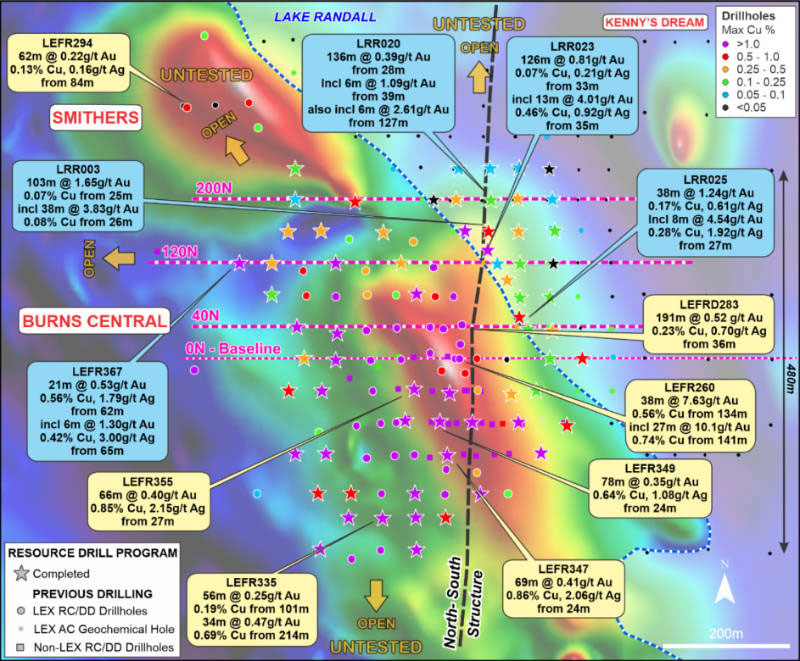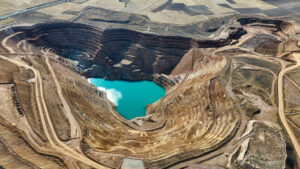Lefroy’s Burns Central drill success points to large porphyry system

Burns Central success points the way for more along the Burns Corridor. Pic via Getty Images.
The Burns Central system is proving to be a real prize for Lefroy after drilling returned more thick intervals of gold, copper and silver porphyry mineralisation to the northwest.
Final assays for 39 reverse circulation drill holes over a 240m strike north of the baseline discovery section returned results such as:
- 103m grading 1.65 grams per tonne (g/t) gold, 0.07% copper and 0.24g/t silver from a down-hole depth of 25m including 38m at 3.83g/t gold, 0.08% copper and 0.26g/t silver from 26m(LRR003);
- 38m at 2.04g/t gold, 0.27% copper and 0.66g/t silver from 27m including 17m at 3.9g/t gold, 0.54% copper and 1.38g/t silver from 26m (LRR004); and
- 126m at 0.81g/t gold, 0.07% copper and 0.21g/t silver from 33m including 13m at 4.01g/t gold, 0.46% copper and 0.92g/t silver from 35m (LRR023).
Importantly for Lefroy Exploration (ASX:LEX), the results significantly strengthen and expand the mineralised footprint of Burns Central by outlining a large zone of strong gold and copper mineralisation with a strike of at least 480m and vertical depth of approximately 200m from surface, which remains open in all directions.
And while the result is certainly exciting in its own right, the discovery at Burns Central is really just the tip of the iceberg as it is just one of multiple, largely untested magnetic anomalies that are considered to be mineralised intrusive centres along a 2.5km trend.
Drilling Lovejoy
Initial diamond drilling at Lovejoy – one of these anomalies located 1.5km north of Burns Central – has already returned results such as 11m at 0.68% copper and 0.4g/t gold from 50m and 45m at 0.33% copper and 0.3g/t gold from 258m in hole LEFD009, which is a strong indicator that the company is right on the money.
“These recent results confirm that the Burns Corridor hosts a broad, alkalic-porphyry-style mineral system with increasing scale,” managing director Wade Johnson said.
“Alkalic porphyry systems have the potential to form large ore deposits where numerous porphyry systems with smaller strike extents add up to mineral systems with significant total copper-gold endowment.
“The discovery at Burns Central has only just “scratched the surface”, outlining a 480m-long area that remains open and is only one of multiple magnetic anomalies, such as “Lovejoy”, along the 2.5km trend.
“Initial drill testing has shown that these anomalies have all the right characteristics to host multiple Burns Central-type deposits.”
Results from all 67 holes in the drill program, which have all been assayed and received, will now be combined with previous drill data to support a maiden resource estimate for Burns Central in early April.

Drill results highlight two trends
Lefroy noted that the drilling at Burns Central has indicated that mineralisation north of the baseline section follows two distinct trends.
The first is a higher-grade gold trend predominantly hosted by diorite porphyry within the ‘Central Porphyry’ domain that is associated with an interpreted north-south structure.
This gold trend is open at depth and to the north beneath Lake Randall, where it has only been partially tested by shallow aircore drilling
The other northwest trend of gold and copper is hosted largely in basalt surrounding the porphyry intrusions, with its limits yet to be defined.
Notably, this gold-copper trend is interpreted to coincide with the magnetic anomalies along the Burns Corridor, which the company interprets to be part of a larger scale group of alkalic-porphyry-style systems, centred around the Burns intrusive complex.
These magnetic anomalies include the Smithers magnetic anomaly immediately to the north of Burns Central that has only been tested by a single RC hole which intersected broad gold, copper, and silver mineralisation, including 62m at 0.22g/t gold, 0.13% copper, and 0.16g/t silver from 84m.
Unsurprisingly, this anomaly is a high priority target for follow-up exploration to expand mineralisation beyond Burns Central.
Lefroy will also carry out drilling at the other magnetic anomalies including Lovejoy.
This article was developed in collaboration with Lefroy Exploration, a Stockhead advertiser at the time of publishing.
This article does not constitute financial product advice. You should consider obtaining independent advice before making any financial decisions.

UNLOCK INSIGHTS
Discover the untold stories of emerging ASX stocks.
Daily news and expert analysis, it's free to subscribe.
By proceeding, you confirm you understand that we handle personal information in accordance with our Privacy Policy.








